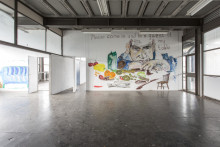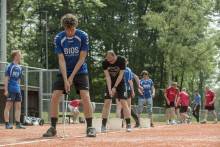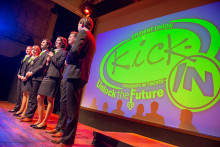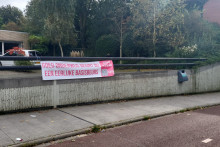Place of origin: Seattle, Washington
Favorite album: Kind of Blue - Miles Davis
Currently reading: Philip Roth
Favorite leisure activity: Traveling
Favorite food: Lime pickle
Favorite TV show: Barend en Van Dorp
Favorite place to be: Paris
Favorite spot in the Netherlands: Broek en Waterland
Favorite member of the Dutch Royal Family: None. "How can the normally reasonable Dutch hold on to an anachronistic, anti-democratic institution?"
Best part about living in the Netherlands: "An easily visible and identifiable Left"
Worst part about living in the Netherlands: The rain
"To be a good scientist, one must understand the consequences of pushing a button," explains Lissa Roberts, UT docent in Philosophy and Social Science (WMW). Roberts' mission is to enable students to examine critically the impact of scientific investigation and technological development on society%s values, priorities, and institutions.
A UCLA graduate with a doctoral degree in History of Science, Roberts arrived at Universiteit Twente in September 2000. Although she commutes twice weekly from Amsterdam, this trip pales in comparison to the longtime bi-continental life she led as a tenured associate-professor at San Diego State University maintaining a permanent residence with her Dutch husband in Amsterdam.
Roberts joined WMW in order to spearhead the creation of a minor in History of Science and Technology. But what is such a minor? In layman's terms, Roberts describes the field as "how we got to know what we know today." Unlike science, history is not an empirical discipline for which there is a single method of study. Instead there are many approaches, each colored by the questions an historian chooses to ask. An outdated point of view holds that the history of science and technology involves just a few important people like Galileo and Einstein and their achievements. Roberts and many of her peers disagree, arguing that the history of science and technology should examine the practical, institutional and broader cultural processes whereby science and technology have developed in general.
In her courses, Roberts emphasizes that "science is an aspect of culture," and thus influenced by broader trends in society. In fact, she contends that "studying scientific development is the best entry into understanding modern culture." The American docent wants students to understand the impact of human actions and decisions on scientific and technological activities.
Roberts' own research includes the origins of the chemical revolution. Currently she is working on a book that traces the introduction of the steam engine % emblematic of industrialization % in the cultural history of the Netherlands. Her point is to show that more can be gained by examining just how an innovative technology was perceived, adopted and adapted in a given cultural context than by asking negative questions such as "why didn't the Netherlands industrialize earlier?"
The minor as well as electives in History of Science are encouraged for students in every curriculum at UT. Such a cursus helps students integrate coursework in their majors within the framework of the relationships of science, technology, and society. Next term, look for Roberts' course entitled, "The Rise of Modern Science."








